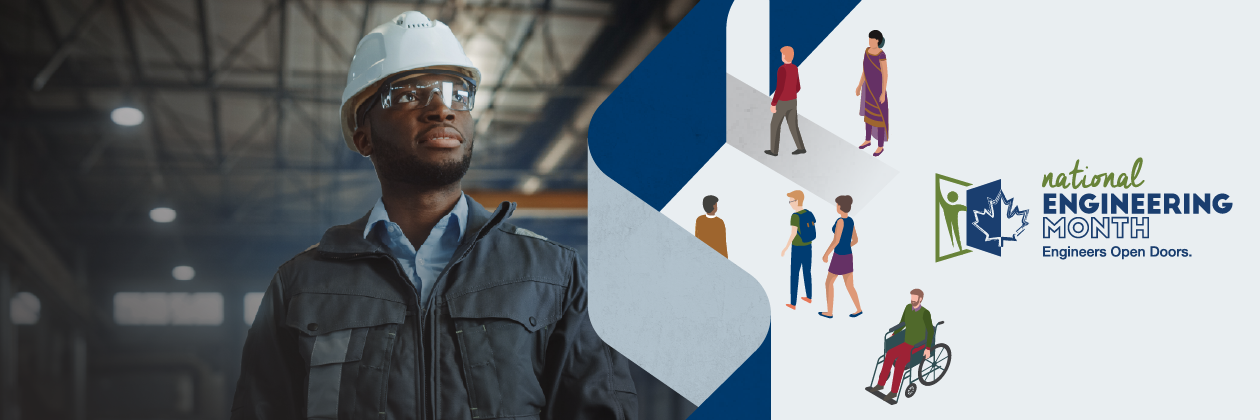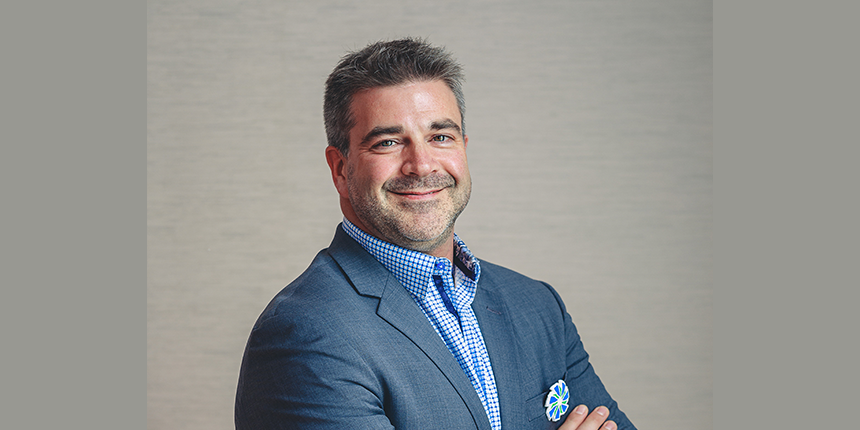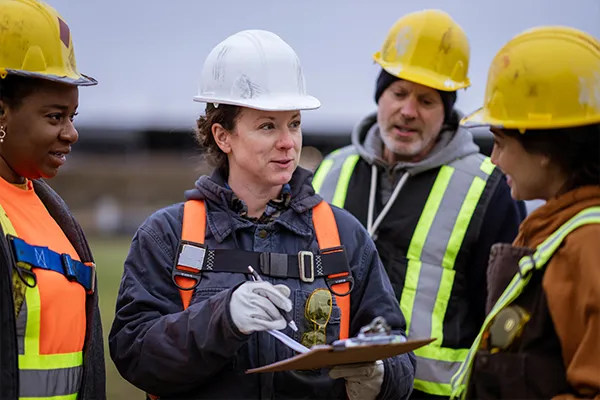

Decades before Ryan Dunbar, P.Eng., was born, his grandmother had to leave her home on the Kingsclear reserve after she married a non-Indigenous man and lost her status according to the law at that time (which has since been changed). She moved a short distance away, maintaining close ties with her community. So did several of her daughters, including Dunbar’s mother, Lynn. After Dunbar’s grandfather passed, Kingsclear welcomed his grandmother back and provided her with a home, even though they had no obligation to do so.
While Dunbar’s mother chose to raise her family off the reserve, she encouraged her son to spend plenty of time there with his grandmother. The two became very close—so close that Dunbar later named his daughter after her. However, he openly acknowledges that his own upbringing differed significantly from that of his cousins who were raised in the community.
“Their experience was very different than mine, but our reasons for trying to create change or progress are similar. I recognize that the path that I took to get here, although it had its own obstacles and challenges, was certainly easier than for some of my extended family. So my perspective is different, but my motivations aren't,” Dunbar says.
His mother found other ways of encouraging Dunbar to embrace his Indigenous heritage. When he was in university, she invited him to chaperone a group of community youth going out on the land to learn more about their culture.
“She didn't want to tell me she was sending me out there to learn my culture with a bunch of kids, because that might seem weird to a 20-year-old. Instead, she told me I was going out there to do this good thing, and I was happy to do so. That reshaped the way I've done everything since. Mom planted this seed, and the organization I've built, the people I've touched, the communities I've worked with, is because of that seed.”
Today, Dunbar is a professional engineer and hydrogeologist and a proud member of the Bilijk Wolastoqiyik (Kingsclear First Nation) in New Brunswick. He is the founder of SOAR Professional Services, an innovative company that provides Indigenous-focused services in the areas of planning, engineering, environmental science, and management consulting. The company operates in a limited partnership with Dillon Consulting Limited, a relationship that provides SOAR with strategic technical support and capacity-building.
Engineering has opened the door for Dunbar to make tangible change—not only for his own community, but for other Indigenous communities and engineers.
Water works
While completing his engineering education at the University of New Brunswick (UNB), Dunbar benefited from scholarships provided by the organization now known as Indspire (among others), which only added to his existing desire to give back to his community. Because his areas of interest were water and the environment, he hoped to find a way to improve the water situation on reserves. Reasoning that securing clean source water could serve as a path to ensuring safe drinking water for Indigenous communities, he earned a master’s degree in hydrogeology, studying under the Canada Research Chair in groundwater studies at UNB.
By the time he graduated and began working as an environmental engineer with Dillon Consulting, Dunbar’s mother had been elected to the Kingsclear council. This improved his understanding of community governance and their strategic objectives and policy. Naturally, the first thing he wanted to examine was the water system.
“I had this opportunity to meet the Public Works director in Kingsclear. He took me down to the water system in our community. I said, ‘We're in the floodplain, so it floods here usually once every couple of years. What do you do in that situation?’ And he said, ‘We just wait until the water goes away.’”
Flooding wasn’t the only issue at Kingsclear’s water treatment facility, and Dunbar wanted to prevent a Walkerton-esque crisis down the road. Leveraging some marketing funding provided by Dillon as part of their client relationship management training, he and a colleague put together a comprehensive proposal to make the community water system safe and functional and brought it to Indigenous Services Canada, who greenlit the project. The work was completed within three years, leaving the Kingsclear community with a much safer and reliable drinking water system.
That success led Dunbar to undertake many more projects with other Indigenous communities.
“Having never worked with Indigenous Services Canada, all of a sudden we were doing tons and tons of projects across different disciplines in different areas, including environment, governance, policy, and I got to work on and learn about all of them. The way I describe it is that Dillon gave me a $3,000 marketing budget and in return we improved the delivery of technical services and marketing for Indigenous clients across Canada.”
Dunbar says although every Indigenous community is unique, many of the infrastructure challenges they face are similar, so many solutions can be transferable.
Starting to SOAR
In 2019, Dunbar approached Sean Hanlon, his mentor at Dillon, who by that time had risen to the role of President (later becoming CEO), and presented his idea to create a partnership between Dillon and a new company Dunbar wanted to build, which became SOAR Professional Services. SOAR would offer job opportunities and a more accessible space for career development to Indigenous engineers, geoscientists, planners and knowledge holders, creating a team that could continue the work Dunbar had refined while at Dillon, providing Indigenous-grounded planning, engineering, and environmental services to Indigenous communities across Canada, supported by Dillon’s established larger multi-disciplinary workforce.
“[SOAR] is conceptually about creating an opportunity for Indigenous persons seeking out a platform to compel change in their communities. SOAR provides these individuals with the same tools and opportunities that were given to me to support continued progress. We’ve got to create a culture that inspires everyone to work in these unique communities, so that they can offer their valued perspectives and experiences such that it can shape and benefit the projects that we’re working on.”
Dillon signed on and provided startup funding to launch SOAR in early 2020—just weeks before a global pandemic was declared. Undaunted, Dunbar and SOAR successfully partnered with Dillon on a contract with the newly created Atlantic First Nations Water Authority, an Indigenous-led organization seeking to improve water delivery to Indigenous communities across Atlantic Canada. The project team was tasked with obtaining a baseline of water systems in the various member communities and planning how to develop the water authority’s investment over the next 10 years, as part of their Asset Management Planning Project.
“We were being afforded this opportunity to lay out the roadmap for all these member communities for an Indigenous-led organization being managed by Indigenous operators. One of the things I’ve always taken pride in is the approach that we took to our water and wastewater systems. We work collaboratively with the community to truly understand the problem and co-create a solution based on the understanding we gained from their experiences and limitations commonly presented in daily operations and maintenance of their systems.”
Shifting to economic development
After his success with Kingsclear’s water system renewal, Dunbar asked his mother what else the community could benefit from. At the time, like many Indigenous communities, Kingsclear had a housing shortage and insufficient funding to build the more than 100 homes that were needed. The clearest path to addressing this shortage was through increased generation of community own-source revenue.
The community already had a gas station, but they needed to change the way they approached the business in order to increase sales. Dunbar suggested moving the station to adjoin the provincial highway that runs through the middle of the community. He helped them secure funding to build a brand-new gas station and convenience store, which is now highly successful and services a very busy highway. He also helped to secure funding to build a new subdivision on the reserve, which was fully used within two years as a result of the community’s successful economic growth.
Dunbar says Indigenous communities need continued economic development to fund projects like these and support their own development and self-determination.
“True community-based sovereignty cannot exist without economic sovereignty. That’s why economic development became so important to me. If you can resolve financial limitations, then the community is empowered to invest in what they truly need, not what funding programs dictate. You can create employment. You can create housing. You can build programs. You can add more economic development, propelling more progress.”
Giving thanks
While it was engineering that opened the door for Dunbar to support both his own Indigenous community and others across Canada, it was his desire to hold that door open for others that led him to found SOAR.
Dunbar credits both Hanlon, the the CEO at Dillon, and his mother for much of the success he has experienced.
“I was provided this opportunity, in this company, because of the relationship I had with this incredible human being, and he helped me believe I could move mountains—a trait my mother impressed upon me since day one. This is the reason why I step up to any challenge. Just because something may appear to be broken or too complicated doesn't mean we shouldn’t try to work toward resolving it.
“Make no mistake, my grandmother was instrumental, but my mother created me. It's the reason why I have so much empathy. She’s the reason why I do what I do. A day doesn't go by that I don't think of her or the lessons she instilled in me.”
More in this series

The engineering profession's continuing commitment to EDI

From the symbolism of the iron ring to engineering licensure: Enshrining ethics in engineering

100 years of the iron ring: A symbol of an engineer’s commitment

